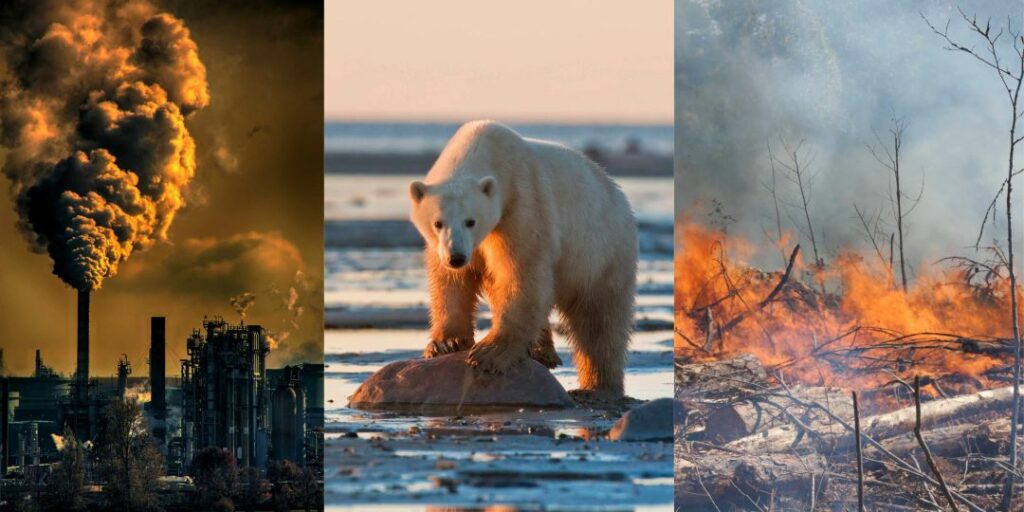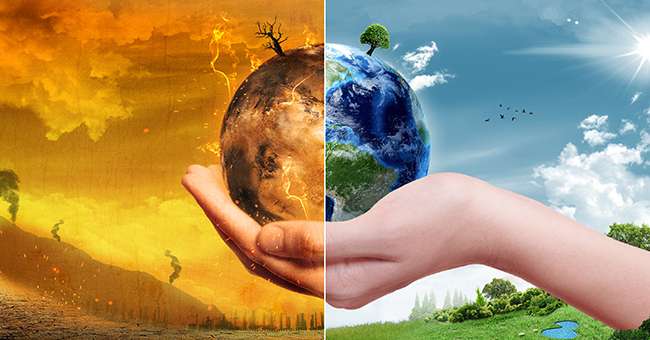Introduction
Climate change is one of the most pressing global challenges of our time. It refers to the long-term shifts in temperature patterns and weather conditions on Earth, primarily caused by human activities such as the burning of fossil fuels and deforestation. In this article, we will explore the causes and impacts of climate change, as well as discuss the urgent need for collective action to mitigate its effects and build a sustainable future for generations to come.

Understanding Climate Change
1. The Greenhouse Effect
The greenhouse effect is a natural process that plays a vital role in regulating the Earth’s temperature. Certain gases in the atmosphere, such as carbon dioxide (CO2) and methane (CH4), trap heat from the sun, creating a warm and habitable environment. However, human activities have significantly increased the concentrations of these greenhouse gases, leading to an enhanced greenhouse effect and global warming.
2. Rising Global Temperatures
The increased concentration of greenhouse gases in the atmosphere has resulted in a steady rise in global temperatures. This warming trend, known as global warming, has far-reaching consequences for ecosystems, weather patterns, and human societies. Rising temperatures contribute to the melting of polar ice caps, the intensification of extreme weather events, and the disruption of delicate ecological balances.
3. Impacts on Ecosystems
Climate change poses significant threats to ecosystems around the world. Shifts in temperature and precipitation patterns disrupt natural habitats, leading to species extinction, altered migration patterns, and changes in plant and animal phenology. Coral reefs, for example, are particularly vulnerable to rising ocean temperatures, resulting in coral bleaching and the loss of biodiversity.
4. Extreme Weather Events
The warming climate has been linked to an increase in the frequency and intensity of extreme weather events. Heatwaves, droughts, hurricanes, and floods are becoming more frequent and severe, putting human lives, infrastructure, and food security at risk. These events have devastating socio-economic impacts, especially on vulnerable communities with limited resources and infrastructure.
5. Ocean Acidification
As the concentration of CO2 in the atmosphere rises, a significant portion of it is absorbed by the oceans. This process, known as ocean acidification, leads to a decrease in the pH of seawater. Acidic waters pose a threat to marine life, particularly organisms with calcium carbonate shells or skeletons, such as corals and shellfish. The degradation of marine ecosystems affects not only biodiversity but also the livelihoods of communities dependent on ocean resources.
Taking Action Against Climate Change
6. Mitigating Greenhouse Gas Emissions
Reducing greenhouse gas emissions is crucial to combatting climate change. Transitioning to renewable and cleaner energy sources, improving energy efficiency, and implementing sustainable land-use practices are vital steps towards mitigating emissions. International agreements like the Paris Agreement aim to limit global warming to well below 2 degrees Celsius above pre-industrial levels and pursuing efforts to limit the temperature increase to 1.5 degrees Celsius.
7. Adapting to a Changing Climate
Adaptation is essential to cope with the current and future impacts of climate change. This involves building resilient infrastructure, implementing sustainable water management strategies, enhancing disaster preparedness, and supporting communities vulnerable to climate-related risks. Adaptation efforts can help reduce the adverse effects of climate change and enhance the resilience of ecosystems and societies.
8. Promoting Sustainable Practices
Individual actions play a crucial role in addressing climate change. By making sustainable choices in our daily lives, such as reducing energy consumption, adopting eco-friendly transportation options, and supporting local and sustainable agriculture, we can collectively contribute to reducing our carbon footprint. Education and awareness campaigns are essential for fostering a culture of sustainability and inspiring widespread action.
FAQs about Climate Change
FAQ 1: Is climate change a natural phenomenon?
While Earth’s climate has naturally fluctuated over geological time scales, the current climate change is primarily driven by human activities. The rapid increase in greenhouse gas emissions from burning fossil fuels, deforestation, and industrial processes has accelerated the warming trend observed in recent decades.
FAQ 2: How do scientists study climate change?
Scientists study climate change through various methods, including satellite observations, computer modeling, and analysis of ice cores, tree rings, and other geological records. These multidisciplinary approaches provide insights into past climate patterns, current trends, and future projections, helping us understand the causes and consequences of climate change.
FAQ 3: Can we reverse the effects of climate change?
While some effects of climate change are already unavoidable, it is crucial to take immediate action to prevent further escalation. By reducing greenhouse gas emissions, adopting sustainable practices, and investing in innovative technologies, we can limit the extent of future climate change and mitigate its impacts.
FAQ 4: What role do forests play in climate change?
Forests act as vital carbon sinks, absorbing CO2 from the atmosphere through photosynthesis. Deforestation contributes to increased greenhouse gas emissions, as trees release stored carbon when they are cut down or burned. Protecting and restoring forests is crucial for mitigating climate change and preserving biodiversity.
FAQ 5: Why should we care about climate change?
Climate change affects all aspects of our lives, from the availability of freshwater and food to the stability of economies and the well-being of future generations. Addressing climate change is not only an environmental imperative but also a moral obligation to create a sustainable and equitable world for current and future populations.
FAQ 6: Can individuals make a difference in fighting climate change?
Absolutely! Individual actions collectively make a significant impact on addressing climate change. By adopting sustainable habits, advocating for change, and engaging in informed discussions, individuals can inspire others, contribute to a greener economy, and drive the transition to a sustainable future.
Conclusion
Climate change presents a global challenge that requires urgent action at all levels of society. By understanding the causes and impacts of climate change and committing to sustainable practices, we can work towards a more resilient and equitable future. Through collective efforts, we have the power to mitigate the effects of climate change, protect our planet’s precious ecosystems, and ensure a thriving world for generations to come.
============================================


